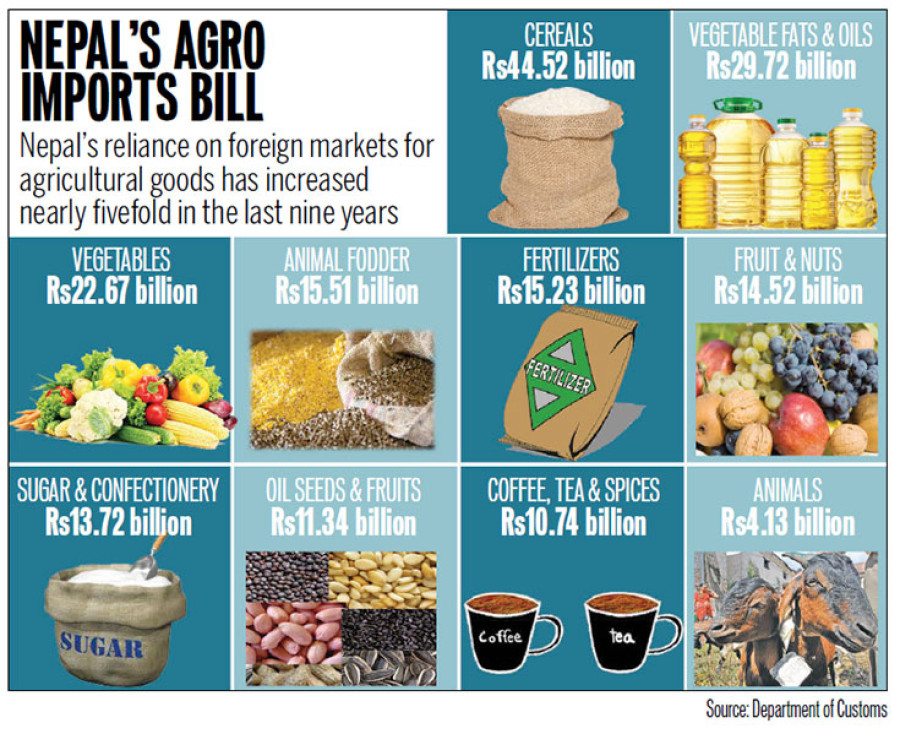Money
Agro products import bill crosses Rs200b
Nepal’s agricultural goods import bill crossed Rs200 billion for the first time in the last fiscal year, propelling an already bloated trade deficit to its highest level on record.
Sangam Prasain
Nepal’s agricultural goods import bill crossed Rs200 billion for the first time in the last fiscal year, propelling an already bloated trade deficit to its highest level on record.
According to the Department of Customs, Nepal imported farm products worth Rs215.50 billion in the last fiscal year, up 10 percent year-on-year. The share of agro products in the total import bill has swelled to 17 percent. The country’s total import bill amounted to Rs1,243 billion in the last fiscal year.
Nepal’s reliance on foreign markets for agricultural goods has increased nearly fivefold in the last nine years. The food import bill in 2009-10 amounted to Rs44.43 billion. The import bill jumped to Rs76.05 billion in 2011-12 and to Rs99.35 billion in 2012-13. It further ballooned to Rs127.51 billion in 2013-14.
In 2014-15, Nepal imported agro products worth Rs157.78 billion, pushing agro commodities to the top of the list of imports and knocking petroleum products from the number one spot.
Experts said that a swelling middle class, expanding population and stagnant local agricultural production were driving up Nepal’s food imports. The growth is unlikely to stop due to increased migration of farm labour to foreign job destinations as the agriculture sector has started to lose its shine due to a low rate of return.
Economists Keshav Acharya said land is no more a mode of production. “Today, land has become a ‘store of value’—an asset that can be traded at high cost which is way above the value of crop production,” he said.
One of the key reasons behind stagnant agricultural production is labour shortage. “And the country’s mechanization policy failed to address the problem of labour shortage,” said Acharya.
Similarly, Nepali consumption patterns have changed. Currently, people are eating larger amounts and they are eating higher quality food due to a rise in income levels. “As consumption has increased, obviously the demand is met by imports,” said Acharya.
A growth in the food processing industry has also increased the import bill. Expansion in the livestock industry was another reason for the increase in the agro product import bill. Customs Department statistics show that imports of animal fodder amounted to Rs15.51 billion in the last fiscal year.
Cereal tops the list of agro imports followed by edible oil, vegetables and food and animal fodder. As per the figures, the cereal import bill amounted to Rs44.52 billion in the last fiscal year, up from Rs40.14 billion in the previous year. Agro experts say that Nepal started importing cereals seven to eight years ago, and now imports have risen to alarming levels.
This is mainly because the expanding population of middle-income Nepalis prefers to eat basmati rice, and Nepal doesn’t grow such fine rice in sufficient quantities. Edible oil imports amounted to Rs29.72 billion in the last fiscal year, up from Rs28.83 billion.
Similarly, the vegetable import bill increased to Rs22.67 billion in the last fiscal year from Rs21.50 billion in the previous fiscal year.




 20.12°C Kathmandu
20.12°C Kathmandu














